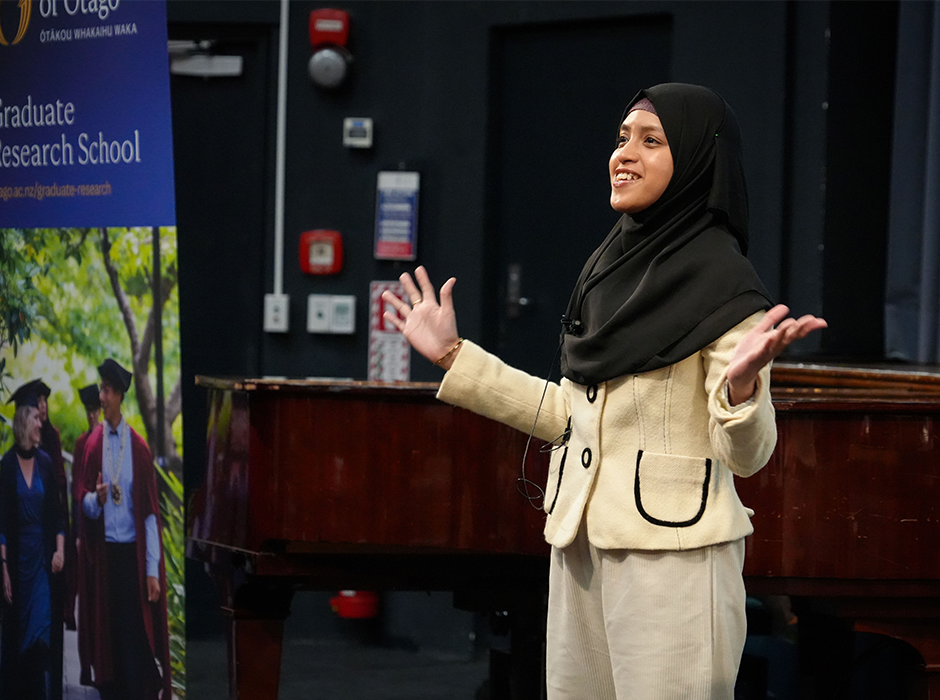
Arung on stage at the Grand Final, showing some of her expressive elan.
Arung Mayapada is an extrovert by stealth.
She used this secret weapon to great effect while presenting her PhD research topic – ‘Do UK charities perform better with women trustees?’ – at Otago’s recent Three Minute Thesis (3MT®) Grand Final. It won her the People’s Choice Award.
Dr Pallab Biswas (primary supervisor) and Associate Professor Helen Roberts (co-supervisor) from the Department of Accountancy and Finance, have clocked this covert Mayapada verve – they’ve seen how her hands and face dance when doing her mind’s impassioned bidding.
“Arung has a lovely way of winning over and engaging her audience. I think she’s naturally extroverted although that may not be obvious when you meet this petite, hijab-wearing woman for the first time,” Helen says.
Asked if she thinks people are pleasantly staggered when she unleashes her hidden extrovert, Arung grins.
“I think I might have a bit of a secret superpower there. People do tend to be surprised, especially if they have only previously met me in a more low-key setting. But when I am passionate about something, that energy just comes out naturally. I guess you could say I am an extrovert in disguise.”
Arung honed her audience-wooing skills while lecturing at Tadulako University in her home country of Indonesia.
“Teaching in Indonesia was like boot camp for public speaking. Engaging students in a class when they would rather be anywhere else really forces you to find creative ways to capture their attention. It taught me the power of storytelling, humour, and most importantly, passion.”
It wasn’t hard for her to feel ardent about her PhD topic. Once she noted the lack of gender diversity on UK charity boards, she was suitably galvanised. Though women account for more than two thirds of the UK’s charity workforce, men outnumber women in the most influential decision-making positions, and only two in five charities have at least one female trustee.
“It was shocking, honestly. I knew there was an imbalance, but I didn't expect it to be so stark, especially in a sector that prides itself on fairness and equality. The more I dug into the data, the more it became clear that this was not just a minor issue – it’s a significant problem that impacts the effectiveness of charities and their ability to serve their communities.”

Arung, with her supervisors, Helen Roberts and Dr Pallab Biswas.
“They are more likely to adopt a transformational leadership style, they bring strengths of listening to others, co-ordinating, and co-operating.”
Condensing 30 pages of research to fit compellingly within the unforgiving confines of a three-minute presentation was something Arung relished.
“The time constraint forced me to be both clear and compelling, which was a fun challenge in itself. I practised in front of my best friends almost every day – they said they’d also memorised my script.”
Arung made sure her final lines would land with sufficient impact.
“I spent more than a week finding those lines – and had some help from my friends and Helen to polish them. I wanted to leave the audience with something memorable, something that would make them smile but also think.”
With the clock ticking down, she ended her presentation on a winningly direct note.
“No offence to men trustees, but the empirical evidence shows that a balanced representation of men and women on charity boards maximises charity performance. Let me conclude this pitch: being charitable is simple, just open your heart, open your wallet, and trust women.”
She hopes her research will serve as a catalyst for change.
“I want to encourage charities to rethink their board composition. Ultimately, I hope it contributes to a more equitable and effective charitable sector.”
Arung submitted her thesis the day after the 3MT® Grand Final. As someone who admits she got bored with her last lecturing role after three years, it’s unlikely she’ll take her foot off the gas for long.
“I want to keep pushing for change through academia and using my skills to make a real impact. And who knows, maybe a bit more public speaking – I’ve discovered I quite enjoy it.”
Kōrero by Claire Finlayson, Communications Adviser (Otago Business School)